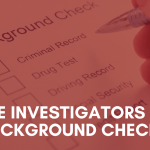As private investigators work to gather information, they must be mindful of the search and seizure laws that govern their activities. One of the most important areas of law that private investigators must be familiar with is search and seizure. Understanding search and seizure laws can help private investigators conduct investigations in a legal and ethical manner. In this article, we will discuss some of the key aspects of search and seizure laws for private investigators.
What are search and seizure laws?

Search and seizure laws govern how law enforcement officials, including private investigators, can search for and seize evidence. That is to say, these laws are rooted in the Fourth Amendment of the United States Constitution. Which in turn protects citizens from unreasonable searches and seizures. Moreover, under the Fourth Amendment, individuals have a reasonable expectation of privacy. This means law enforcement officials must obtain a warrant before conducting a search or seizure unless certain exceptions apply.
Exceptions to warrant requirements
In some situations, law enforcement officials, and PIs, may be able to conduct a search or seizure without a warrant. These exceptions include:
- Consent: If an individual consents to a search, no warrant is necessary.
- Plain view: If law enforcement officials observe evidence in plain view, they may seize it without a warrant.
- Exigent circumstances: If there is an immediate threat to public safety, law enforcement officials may conduct a search or seizure without a warrant.
- Search incident to arrest: If law enforcement arrested an individual lawfully, said officials may search the individual and the area within the individual’s immediate control without a warrant.
How private investigators can stay compliant
Private investigators can stay compliant with search and seizure laws by taking the following steps:

- Obtain a warrant: Whenever possible, private investigators should obtain a warrant before conducting a search or seizure.
- Obtain consent: If a warrant is not necessary, private investigators should obtain consent before conducting a search or seizure.
- Avoid illegal searches: Private investigators should avoid conducting illegal searches, which could result in the suppression of evidence and other legal consequences.
- Document evidence: Private investigators should properly document any evidence they collect to ensure that it is admissible in court.
- Stay up-to-date: Private investigators should stay up-to-date with changes in the law to ensure that they are conducting investigations in a legal and ethical manner.
Generally speaking, search and seizure laws are an important aspect of private investigation. Private investigators must understand these laws in order to conduct investigations in a legal and ethical manner. For example, by obtaining warrants or consent, avoiding illegal searches, and properly documenting evidence, private investigators can ensure that they are compliant with search and seizure laws.
Learn more about what we do and why you should hire an experienced private investigator. Simply click on this link to get in contact with one of our team members.










